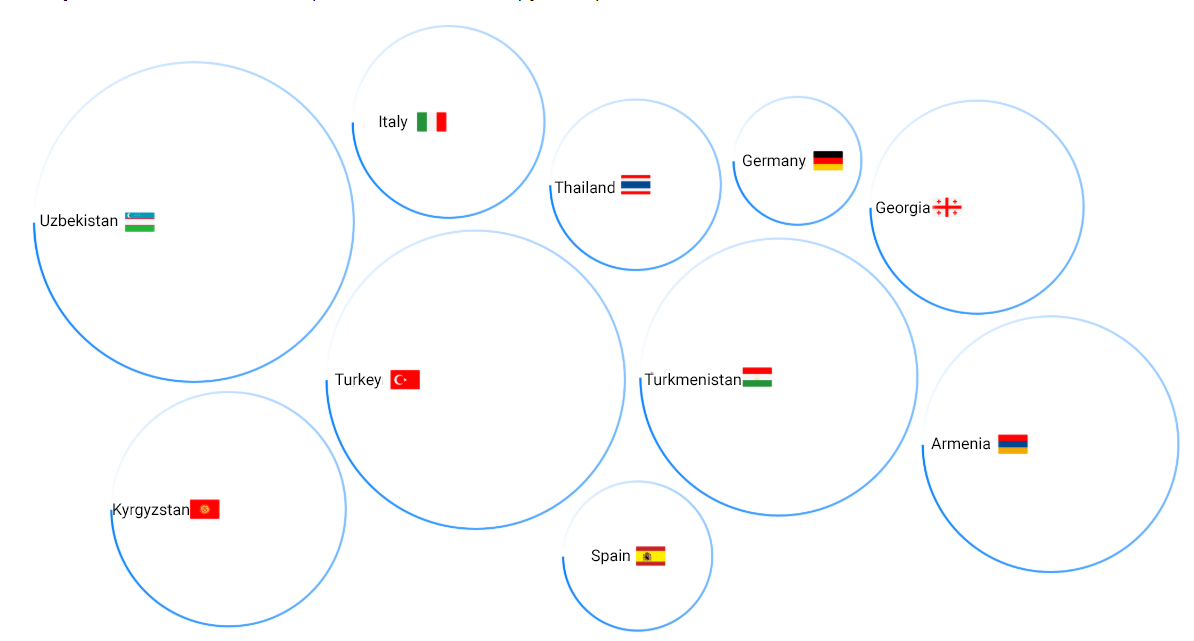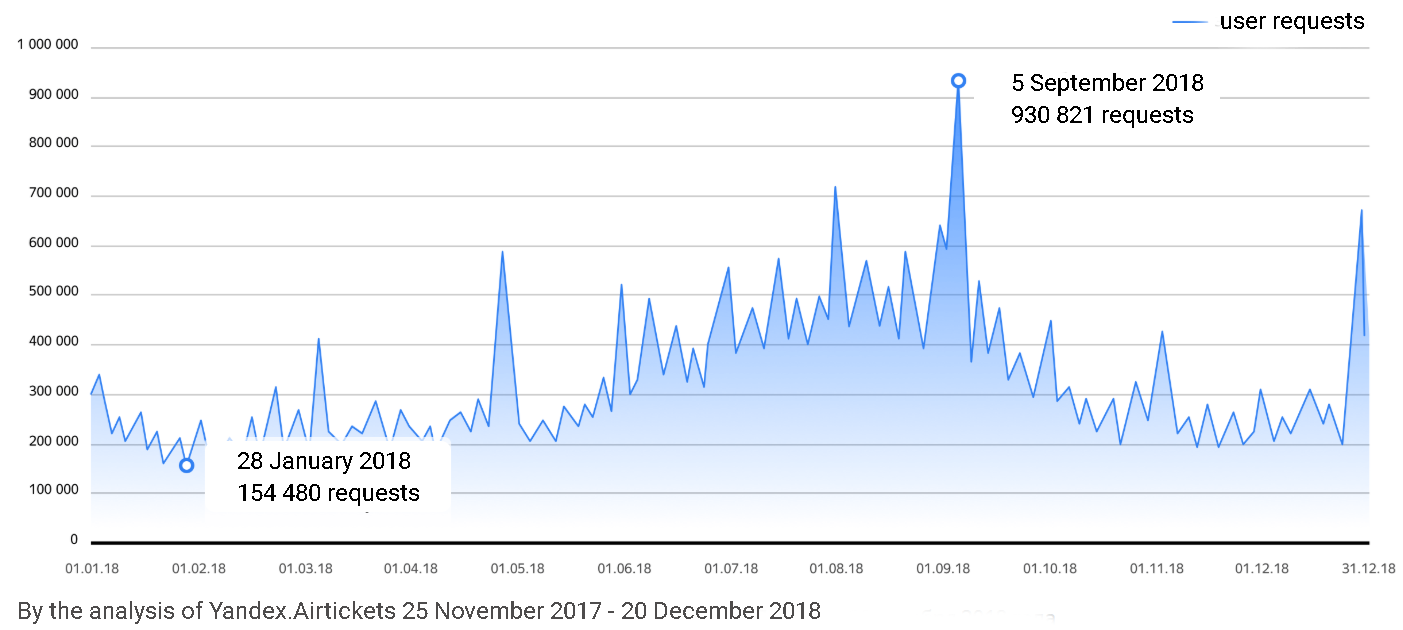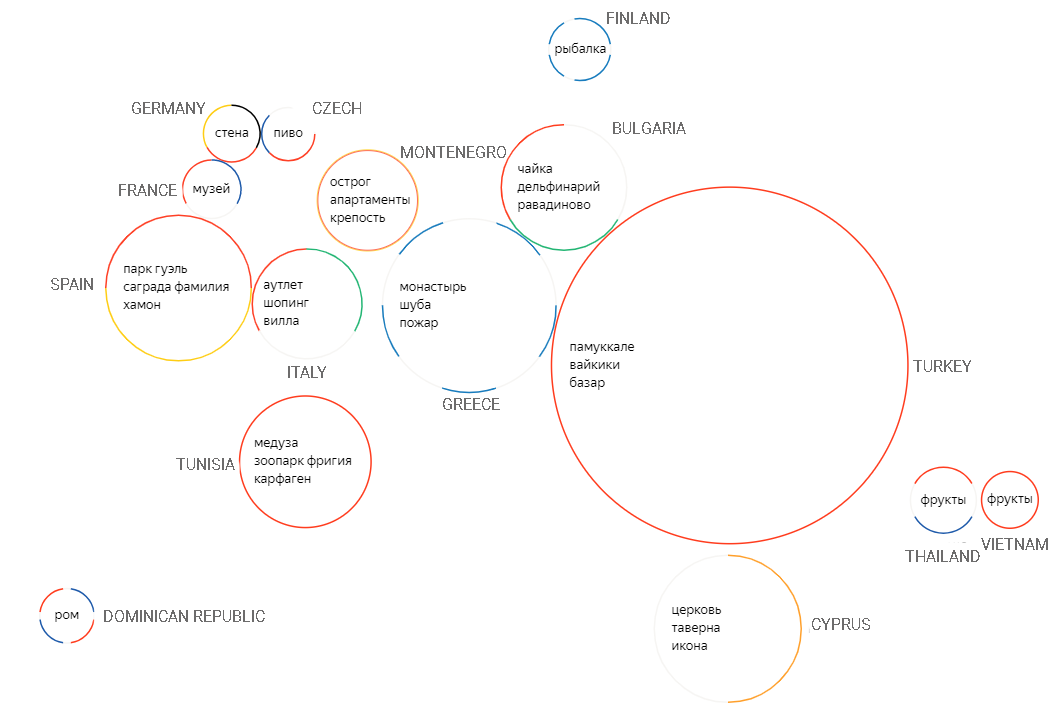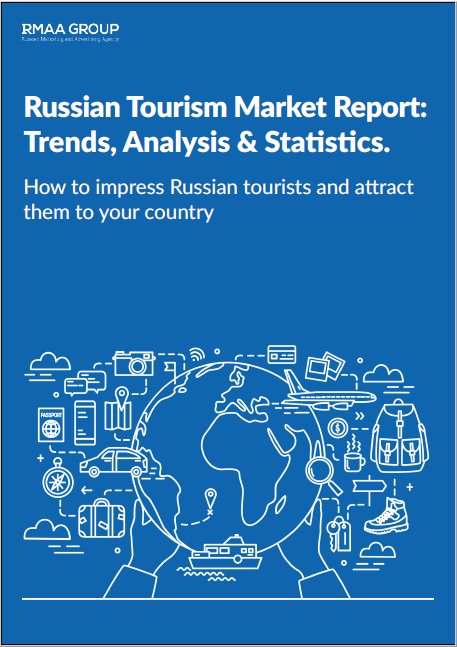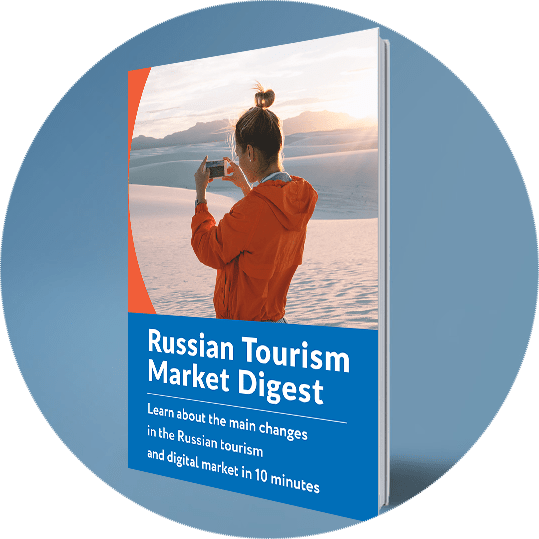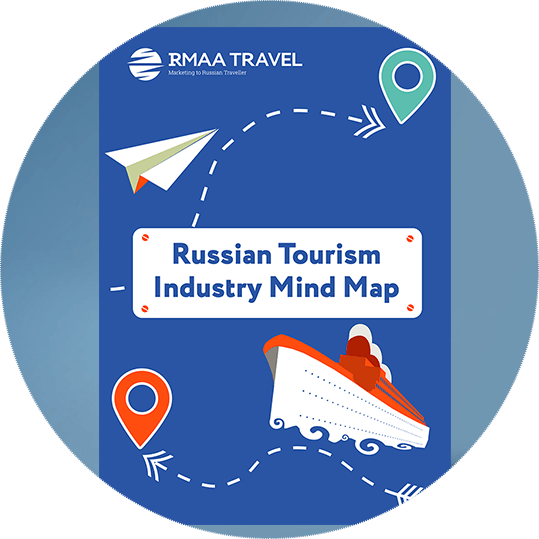Blog about successful marketing strategies in russia
What are Russian tourists interested in being abroad: Vacation Queries


DIGITAL MARKETING
Share this Post
People use Yandex services not only at home, but also abroad. They look up the Internet for opinions on tourist attractions, take interest in local cuisine and history, and handle unknown words and sunburned backs. Yandex experts learned data from search and other services and found out what countries in 2018 were popular among Russian tourists and how human interests change when they become vacationers for a while.
Most Popular Directions
In 2018, people took more interest in flights to Hungary and Georgia: the share of these countries in queries on Yandex.Travel grew most of all—5—6%. Among all resort directions, only UAE moved up on the list. A much larger number of countries lost part of their share in the total number of queries, including popular directions, too. For instance, Turkey, being the 2nd popular country for trips after Uzbekistan, got almost 24% less queries, compared to other countries, in 2018.
Based on the analysis of queries in Yandex.Avia since November 25, 2017 until December 20, 2018.
Where Russians Go On Vacation
Turkey welcomed the largest number of Russian tourists in summer 2018. It was visited by four times more Yandex users than Greece, the next most popular country, and six times more than Cyprus and Spain, which took the third and the fourth place respectively. The most popular African country is Tunisia, while the most popular East-Asian one is Thailand. One representative of Latin America, the Dominican Republic, also hit Top-15.
World in the Eyes of Russian Tourists
Areas of countries are changed in proportion to the number of tourists who visited them.
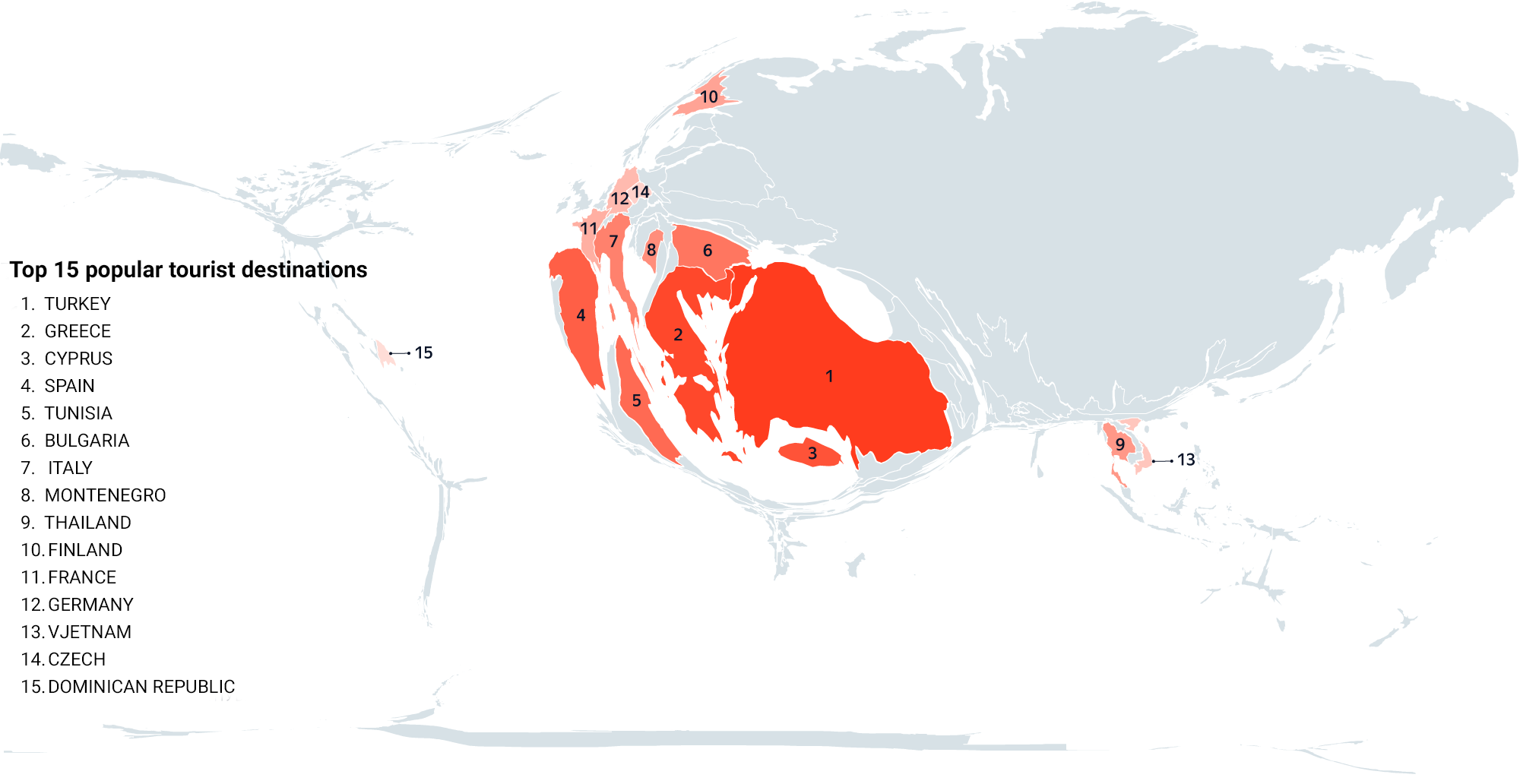
According to Yandex, June-August 2018
Countries’ rating
The countries’ rating significantly varies from city to city. In Saint Petersburg, for example, the shares of those who visited Finland is five times more than in other large cities, while the highest share of those who went on vacation to Western European countries is in Moscow. East of the Urals, such countries as Vietnam, Thailand, and China ranked higher than overall in the country. However, Turkey is still ahead of the pack in most of Siberia and gets outplayed by East Asian resorts only somewhere in between Krasnoyarsk and Irkutsk.
Flight dates
The most popular date of going by air is September 5. People looked for air tickets on this date 930,000 times. The smallest number of queries—154,000—were for air flights on January 28. In general, users are most interested in traveling during warm months: from May till September, the number of queries about air flights grows notably.
What Makes People Tick On Vacation
In order to analyze daytime activity and search interests of tourists, Yandex experts analyzed data about the use of applications only by those users who spent their vacation in summer in the countries out of the Russia-wide Top-15.
Tourists were deemed to be users who, as reflected by data of Yandex mobile apps, stay in Russia most of the time and spent no fewer than three days in another country this summer. In the countries of the near abroad, travelers’ search interests almost do not differ from domestic ones—probably, many people go there to visit their relatives or earn, i.e. not as tourists. That is why these countries were not counted for rating.
To understand what is of interest for people on vacation, word frequency was analyzed in domestic and abroad queries. The most ‘holiday’ queries turned out to be ‘rum’ and ‘supermarket’, while the most ‘homelike’ ones were ‘cinema’ and ‘health center’. Among food and beverages, ‘rum’ and ‘fruit’ can be called most ‘holiday’ and ‘cucumber’ and ‘pizza’ are most ‘non-holiday’. There are also some words used with equal frequency both at home and on vacation—for instance, ‘Putin’ and ‘sky’. The graph shows the list of popular words and how typical they are for queries on vacation and at home.
‘Homelike’ and ‘holiday’ words
Here are examples of popular words located in dependence to how typical they are for queries on vacation and at home. The higher a word is, the most often it is met in queries.
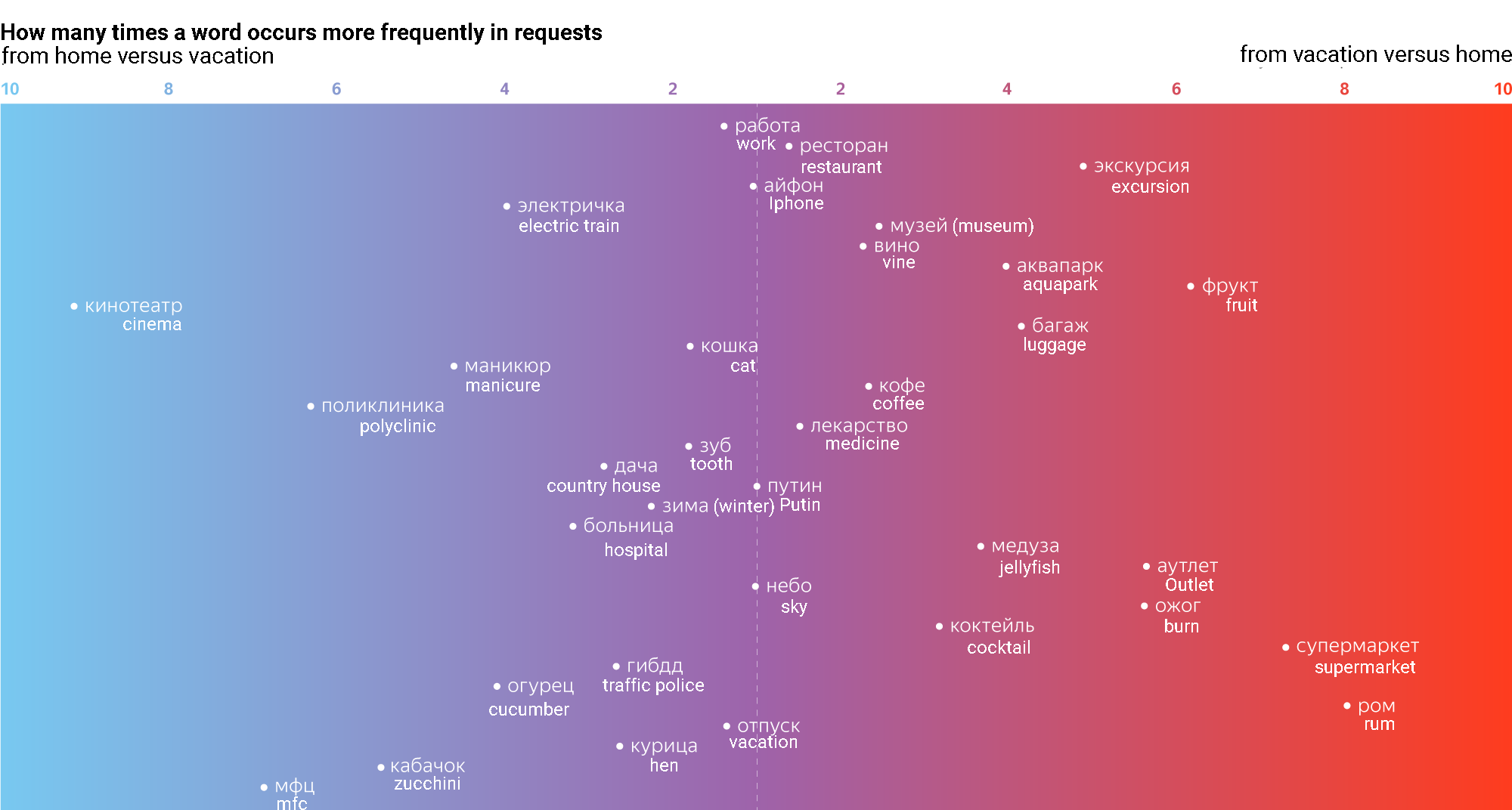
According to Yandex Search, June-August 2018
Tourism interests in different countries are different by content. For example, five most frequent words that are typical for queries in the Dominican Republic are ‘rum’, ‘cocktail’, ‘cigar’, ‘seaweed’, and ‘larimar’. The French Top-5 looks quite different, containing neither food nor shopping—it more or less describes tourist’s places to check: ‘museum’, ‘Louvre’, ‘Versailles’, ‘Disneyland’, ‘Eiffel Tower’. The longest tops of places of interest were in European countries, except for Finland, for which only the queries related to fishing and picnic are typical. As for the number of items in gastronomic tops, Thailand and Vietnam win. The longest shopping list is there, too. For Italy and Spain, the shopping theme is also important, but, unlike in other countries, tourists there are interested not in any goods, but in particular brands.
What Tourists Look For In Different Countries
Circles areas are proportionate to countries’ popularity among Russian tourists. The picture shows the most frequent words and phrases that are seen in queries from those countries at least three times more often that in foreign resorts on average. Geographic names and names of local companies were not considered.
On vacation, people go on watching movies and series in the evening, too. According to queries, many people choose something authentic. The major cinema association with Greece is 300, while The Godfather is most popular in Italy, The Troops of St. Tropez in France, and The Mole cartoon in the Czech Republic. Besides, tourists often look for movies that were shot in a certain country: in Thailand, they are interested in The Beach; in Tunisia, Gladiator and Star Wars; in the Dominican Republic, Pirates of the Caribbean.
The problems that people face when on vacation are seen in their queries, too. In Turkey and Bulgaria, for example, people often ask about viral infections. For Thailand, queries about food poisoning and plankton stings are typical. In Vietnam, people are afraid of counterfeits and, for some reason, cannot deal with lockers in their rooms. In Greece and Montenegro, they are afraid of urchins; in Tunisia, jellyfish.
Many tourists’ queries are related with a need to talk to local people: [how to say in English give me please a good room in the hotel’, ‘how to say in Italian bill], [you look very nice without your coat in Bulgarian] etc. Most of all, usual formulae of politeness are looked for along with words ‘translate’ and ‘in English’, such as ‘thank you’ and ‘please’. As for items, which names cause difficulties most often, a kit of things most needed for a tourist can be made of out them! It includes wine, an iron, a fork, a toothpick, and, of course, a towel.
We invite you to download “The Russian Tourism Market Report: Trends, Analysis & Statistics. How to impress Russian tourists and attract them to your country” and learn more about Russian tourists.
Enjoy reading!
Source: https://yandex.ru/company/researches/2018/vacation
Travel Research
The Russian Tourism Market Report: Trends, Analysis & Statistics | 2019. How to impress Russian tourists and attract them to your country
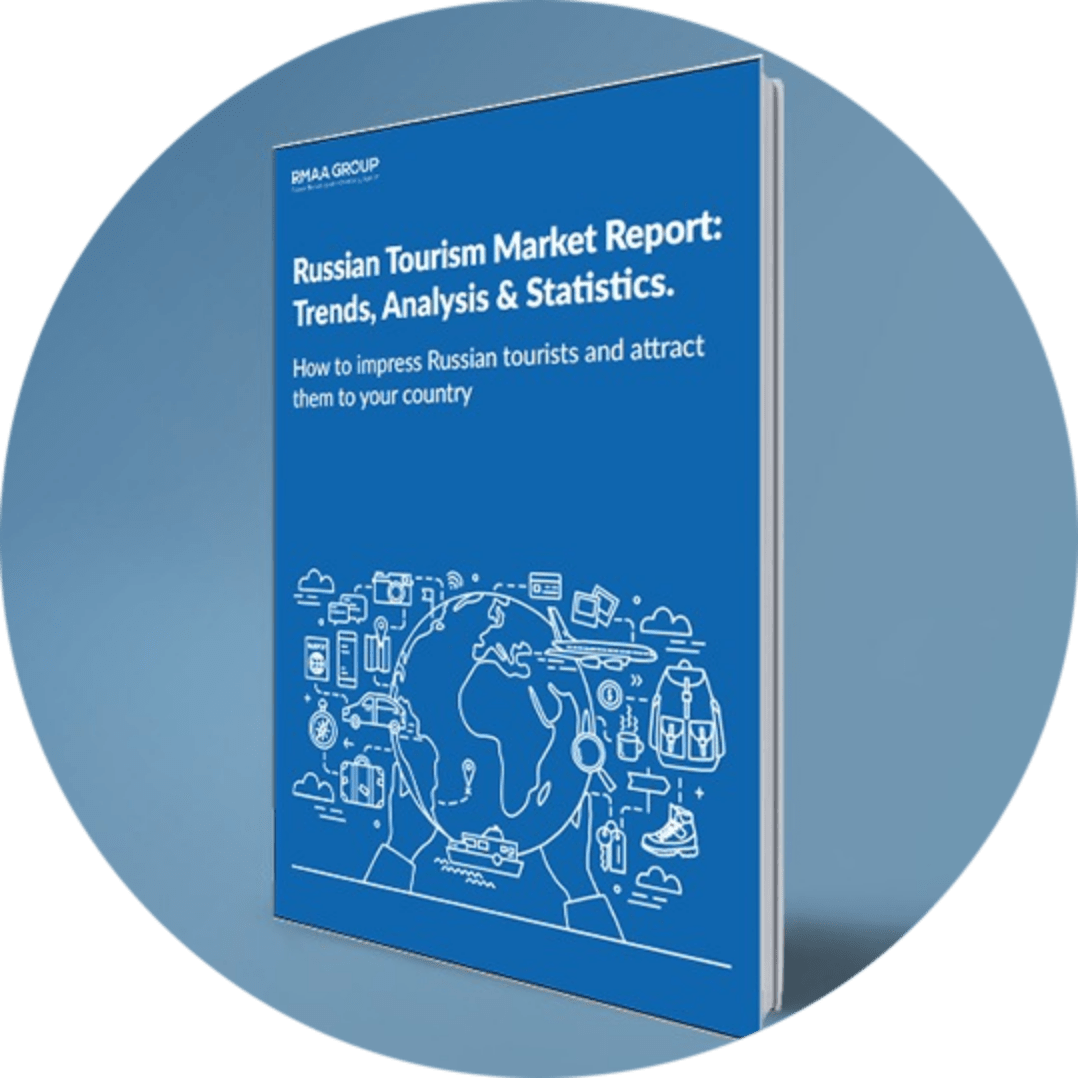
Ready to partner with the specialists in Russian travel marketing and advertising?
About the Author
Head of Digital, editor-in-chief of the RMAA Agency Blog
Join 2,000+ of your Peers!
Get our latest articles delivered to your email inbox and get our exclusive White Paper "Digital Marketing in Russia. Finding your customers on the internet" for FREE!
You will be the first to know about Russian marketing insights,
news and updates from our agency.
Stay tuned!
We're updating our website's design step by step, so some pages may look different. Thank you for your understanding.
Got it









